Last Week On Jokien with Tolkien: Through the Wardrobe
I started a two-part series in last week’s newsletter where I gave an overview of prequels generally and outlined four major factors that I have seen present challenges to many prequels: Pacing the Prequel, Approaching The Predetermined Fate of Characters, Resisting the Temptation to Overdo Fan Service, and Navigating Fidelity to The Source Material.
I covered the introduction and the first of those four factors last week, so in today’s newsletter I’m covering the topics of Fate and Fan Service—Fidelity to The Source Material is just too big a topic to do justice to so I’ll save for a dedicated future newsletter sometime—and have some concluding thoughts about it all. Be sure to open this newsletter in the app or in your browser if your email cuts it off before the conclusion and appendices. Onward!
[There will be some spoilers throughout this post for each show, especially ROP, though I’ll try to limit the major plot revelations for those who haven’t seen them. However, if you’ve been meaning to watch any of these shows but haven’t gotten around to it, consider this your SPOILER WARNING]
Approaching The Predetermined Fate of Characters
So you’re writing a prequel. What’s one issue that you’re going to have no matter what fictional universe you’re working in? Everyone who has seen the originals knows what’s going to happen to any legacy characters you include in your prequel. We all know that little Anakin in The Phantom Menace is going to become Darth Vader eventually and that he can’t ultimately defeat or be defeated by Obi-Wan in Kenobi because they have a final showdown coming in A New Hope. We all know Cassian Andor is going to survive Andor because he appears in Rogue One. We all know that Galadriel will end up ruling Lothlórien with her Silver Clam of a husband in The Lord of the Rings so she can’t sail to Valinor in The Rings of Power.
While this potential issue can rob a prequel of its dramatic tension or excitement, it also can be successfully addressed or subverted. While recruiting Cassian Andor to the Rebellion in episode 4 of Andor, “Aldhani,” Luthen gives him the following reality check and invitation:
No matter what you tell me or tell yourself, you’ll ultimately die fighting these bastards. So what I’m asking is this. Wouldn’t you rather give it all at once to something real than carve off useless pieces till there’s nothing left?
“You’ll ultimately die fighting these bastards” is a moment where Luthen says two true things simultaneously and at different levels of meaning, one to Cassian and one to the audience. To Cassian, it’s just a statement of insight into who Cassian is as well as who the Empire is. “I know you,” Luthen is saying. “There’s no way you can stay out of this fight. And there’s no way you’re going to win this fight. So why no fight for something that’s real and that matters?”
But to the audience, Luthen is acknowledging what everyone who has seen Rogue One knows: Cassian does die, and fighting the Empire too. But he’s telling the viewers that’s not what’s important about this story and that’s not what this story is about. It won’t be a limiting factor, but instead a freeing one.
Diego Luna, who plays Cassian, said as much in a recent interview with The Hollywood Reporter. When asked, “Knowing what you know now about the character, does part of you wish you could go back and play Cassian in Rogue One again?” he replied, “I’ve never thought that way because we were able to tell this story by knowing the end. It was always a reference that Cassian gets there, so how far can we go back?” He continued:
I remind myself all the time of where the character ends up and what choices I made, because that gives structure to everything I’m doing now. So I’m starting the other way around. It’s less, “Oh, I wish,” and it’s more like, “Okay, because I get there, I can do this.” So that is where I found freedom and all the different ways I can get there. And then I’ll think about what is the most unpredictable one. So, all the layers we didn’t get to see in the film, I get to explore them now. If I had tried them at the time, then I wouldn’t be able to explore them now. So it’s just a perspective kind of thing. The freedom comes from knowing exactly what he does.
Instead of being constrained by knowing the ending, Andor has capitalized on the set ending and found freedom in that fate to focus on telling the story of how Cassian gets to Rogue One in the most interesting and highest quality way.
we were able to tell this story by knowing the end…
freedom comes from knowing exactly what he [Cassian] does
Strange New Worlds similarly turned the predetermined fate of its main character into a strength. In Star Trek: The Original Series, we see Captain Pike as a shell of himself after an accident leaves him permanently injured by delta radiation.
In Star Trek: Discovery, Pike glimpses this fate while using a time crystal at a Klingon monastery. Pike’s character arc during Season 1 of Strange New Worlds is defined by him grappling with this foreknowledge. Instead of the fate becoming little more than plot armor shielding him from death during the series and emptying the story of any drama concerning his ultimate fate, giving Pike this foreknowledge adds to the drama and gives the audience something to care about, as well as opening up interesting philosophical questions to explore and scenarios for the writers to place Pike in during the show.
The Rings of Power has not been as successful as either of these shows in turning what could be the challenges or limits of the audience knowing the eventual fates of its characters into freedom or a strength.
Isildur is a character like Cassian or Captain Pike whose eventual fate is well-known: he cuts the ring from Sauron’s finger and dies trying to flee from attacking orcs while swimming the river Anduin. But The Rings of Power ends Season 1 with Isildur’s fate left seemingly uncertain. Many characters think that he is dead and we as the audience aren’t shown whether he’s alive for certain or not. However, everyone who has seen the first five minutes of The Fellowship of the Ring knows that Isildur is still alive to join Elendil—his father—and Elrond and Gil-galad for the Last Alliance of Men and Elves, where he’ll take the Ring and die not long after. So he can’t be dead in The Rings of Power: he has to be alive to die in Fellowship. Now Season 2 could very well make something interesting out of this cliff-hanger without much tension. But at the moment it’s simply not very compelling because we all know the ending and it doesn’t seem like The Rings of Power is doing anything to subvert that or turn it into a strength.
And Isildur is far from the only example here. In many other instances, the attempts to do something interesting with the future fate of characters either fall flat or just don’t work. The worst offender here is the Moria storyline, where mithril forms an important plot point and the Balrog is shown for a split-second. Now I do like the inclusion of the mithril storyline in this particular sense:1 fans who know Moria’s eventual fate will know that mithril was a key component of that fate and should enjoy seeing it play out. But actually showing Durin’s Bane as a tease for basically a split second just felt a little too on-the-nose to me. Look, there he is! We all know what happens soon, don’t we? Wink wink.
Galadriel is another example here of a character whose fate we know. But it seems the strategy for the first season of The Rings of Power was to portray her at a much earlier stage of her character development—proud, impulsive, bent on revenge—to give her space to develop into the regal, ethereal, and mighty ruler we meet in The Lord of the Rings.
To be fair, this sort of change adds drama and has the potential to make a character more interesting and compelling onscreen. It’s what Peter Jackson did to Aragorn, for instance. While Aragorn arrives on the pages of The Lord of the Rings confident in his heritage and destiny, carrying Narsil around with him and having it reforged in Rivendell before the Fellowship departs, in the movies he is conflicted, afraid he will fail as Isildur did, and doesn’t accept Narsil reforged into Andúril until The Return of the King. It is changing the source material, but it works for an adaptation because it gives his character somewhere to develop and move towards as the movies go on.
The problem for The Rings of Power is how vastly different this version of Galadriel comes across compared to the version of Galadriel in Jackson's The Lord of the Rings.2 In attempting to leave room for development, did The Rings of Power go too far?
While we saw glimpses of that development of her character begin in the final two episodes as Galadriel gave away both her sword and her brother’s dagger and while future seasons will help more to answer that question, even I as someone who wanted to like and enjoy this version of Galadriel found the portrayal to be grating for most of the first season.
(continued below)
Consider Joining the Jokien with Tolkien Fellowship By Being a Paid Subscriber
For only $5 a month (or $40 annually—that’s $3.33 a month), you’ll get the monthly essay for paid subscribers and full access to the monthly Book Notes feature. Plus your support goes to a good cause: the continued existence of this newsletter! Hit the button below to find out more!
Resisting the Temptation to Overdo Fan Service
Prequels often reward fans of the original story by including references to or nods to characters, events, and quotes from the original. This can be a rewarding experience as a fan when done well. However, it can also come across as trying too hard or either distract from or ruin a moment instead of enhancing it.
In The Rings of Power, I started off this first season enjoying the direct references to or allusions to The Lord of the Rings. For instance, Sadoc speaking at the Harfoot ceremony in episode three reminded me of Bilbo’s speech at his eleventy-first birthday party. And allusions like the tapestry of Elros and Elrond in Númenor’s Tower of Records serve as a deep-cut reference to the genealogies and history in the Appendices of The Lord of the Rings but also help to visually illustrate the divide between men and elves and some of Elrond’s personal history and loss.
But by the end of the season, the references were losing their luster for me. Maybe it was the sheer number of them—I was able to make spoilers without context tweets that consisted solely of screenshots from LOTR for many episodes, for example—but most likely it was that the specific references seemed to not make the moment from The Rings of Power richer and more resonant but to make the moment in The Lord of the Rings worse.
Consider Bronwyn’s words to her son Theo in episode 6: “In the end, this shadow is but a small and passing thing. There is light and high beauty forever beyond its reach. Find the light and the shadow will not find you.” It’s a nice moment…but it’s so similar to Sam’s speech in The Two Towers that it strains in-universe credulity and broke the suspension of disbelief for me.
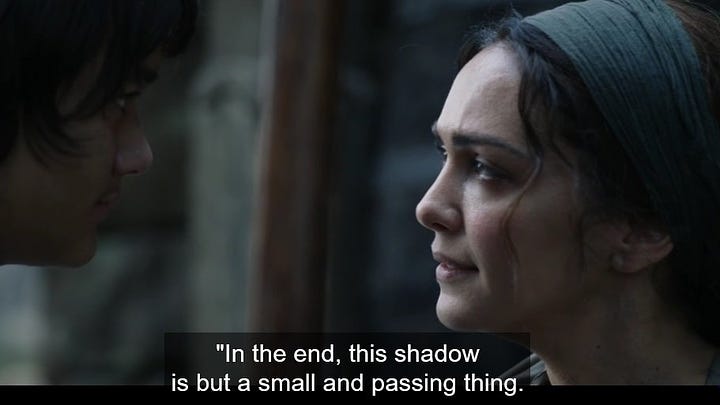
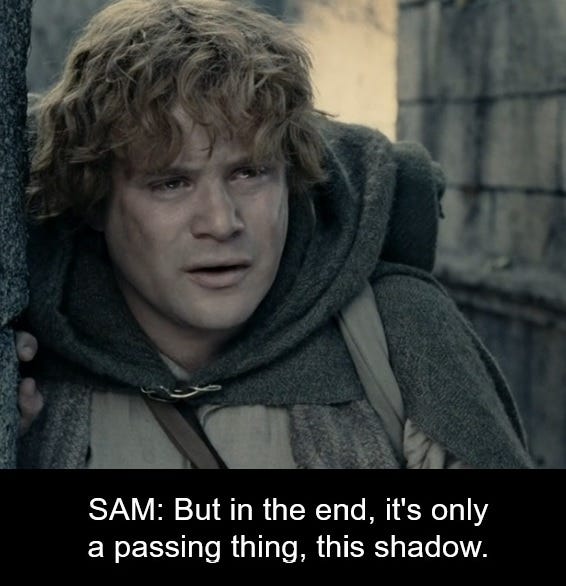
Is “the shadow is a passing thing” or something similar a proverbial saying in Middle-earth? One that would be so well known and endure so long that a human and a halfling living a thousand years from each other would both say basically the same phrase?
The out-of-universe answer, of course, is that both Jackson’s LOTR movies and The Rings of Power are drawing on a passage from The Return of the King where Sam sees a star high above the plains of Mordor.
There, peeping among the cloud-wrack above a dark tor high up in the mountains, Sam saw a white star twinkle for a while. The beauty of it smote his heart, as he looked up out of the forsaken land, and hope returned to him. For like a shaft, clear and cold, the thought pierced him that in the end the Shadow was only a small and passing thing: there was light and high beauty for ever beyond its reach.3
The difference, though, is that it’s a thought directly given to Sam by Tolkien. Whereas Bronwyn, as an original character for The Rings of Power, has no dialogue or thoughts written directly by Tolkien. It’s actually a more direct adaptation of Sam’s thought that Bronwyn shares. But by this point in Jackson’s The Two Towers, Sam has earned this moment. We as an audience care about him and accept this from him. But Bronwyn just hasn’t had the screen time or character development to get to the point where a line like this lands and moves us. And The Two Towers used it first, so even if ROP uses is a little more accurately in a sense here, it’ll still be compared to and interpreted as echoing The Two Towers.
Moments like these or the quick shot of the Balrog in Moria or The Stranger’s “When in doubt, always follow your nose” line fell flat for me. I didn’t feel a thrill or sense of glee when they came onscreen. Instead, I wished for fewer of these intentional echoes of Jackson’s LOTR or for less direct, more nuanced references.
Conclusion
While it may seem like I’ve been too hard on The Rings of Power and didn’t enjoy it, I’d like to say that it’s precisely because I did like so much of the show that I offer some critiques coming from my recent thoughts about prequels. I loved the cinematography and visuals of the show as well as the portrayal of Elrond (especially his interactions with Durin and Disa and his relationship with Galadriel), the score, Adar, and much more.
And it is early yet. For a show with five planned total seasons, there’s lots of room to improve and lessons to learn. Still, seeing how other prequels—especially ones also in their first seasons like Andor and Strange New Worlds—handled some of the same issues prompted me to ask just what the Rings of Power could do better come next season.
If The Rings of Power is paced better next season, can find freedom instead of limits for the journey towards the predetermined fate of its characters that also appear in The Lord of the Rings, and dials back the fan service a bit, I will be all the more excited to see where it goes. But if in doubt, I’ll be sure to follow my nose.
That’s all for today’s newsletter and for the mini-series on prequels. Farewell, friends. Go towards goodness!
Special shoutout and thank you to jhnlnks for upgrading to a paid subscription this week! This is a reader-supported newsletter so if you enjoy these updates each week, please consider joining the other supporters of this Substack by upgrading to a paid subscription:
Or if you would prefer either a $3 monthly subscription, to subscribe at the normal rate but not via Substack, or to subscribe but chip in a little bit extra each month, check out the different tiers on my new patreon!
Want to support me another way? You can also click the ♡ below, forward this to a friend, or share the link on social media. Every little bit helps!
Appendices
As Season 1 aired, I share thoughts on each episode on threads on twitter at Jokien with Tolkien. Would you all prefer I post thoughts each week there, or do weekly updates in posts here on Substack?
After a few serious posts and next week’s upcoming paid subscriber essay, I feel like being a bit more light-hearted in future updates! Look for those in the future!
Interested in a paid subscription but legitimately can’t justify the expense right now? Email me at JRRJokien@gmail.com! I have one sponsored annual subscription to gift to the first person who claims it! No questions asked.
Interested in sponsoring this newsletter? Email me at JRRJokien@gmail.com to reach 2,300+ subscribers.
All typos are totally on purpose. Links may be affiliate.
Not a huge fan of the mithril plotline in general
“There is perhaps no part of the history of Middle Earth that presents so many problems as the story of Galadriel and Celeborn, and it must be admitted that there are many inconsistencies ‘embedded in the traditions’; or to look at the matter from another point of view, the role and importance of Galadriel emerged only gradually, and her story underwent continual refashionings.” Christopher Tolkien in Unfinished Tales on his father’s writings about Galadriel and Celeborn.
The Return of the King, LoTR Book 6, Ch 2, The Land of Shadow


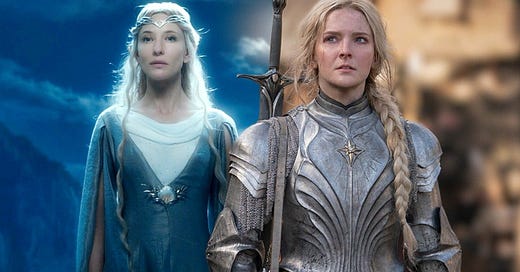



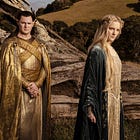
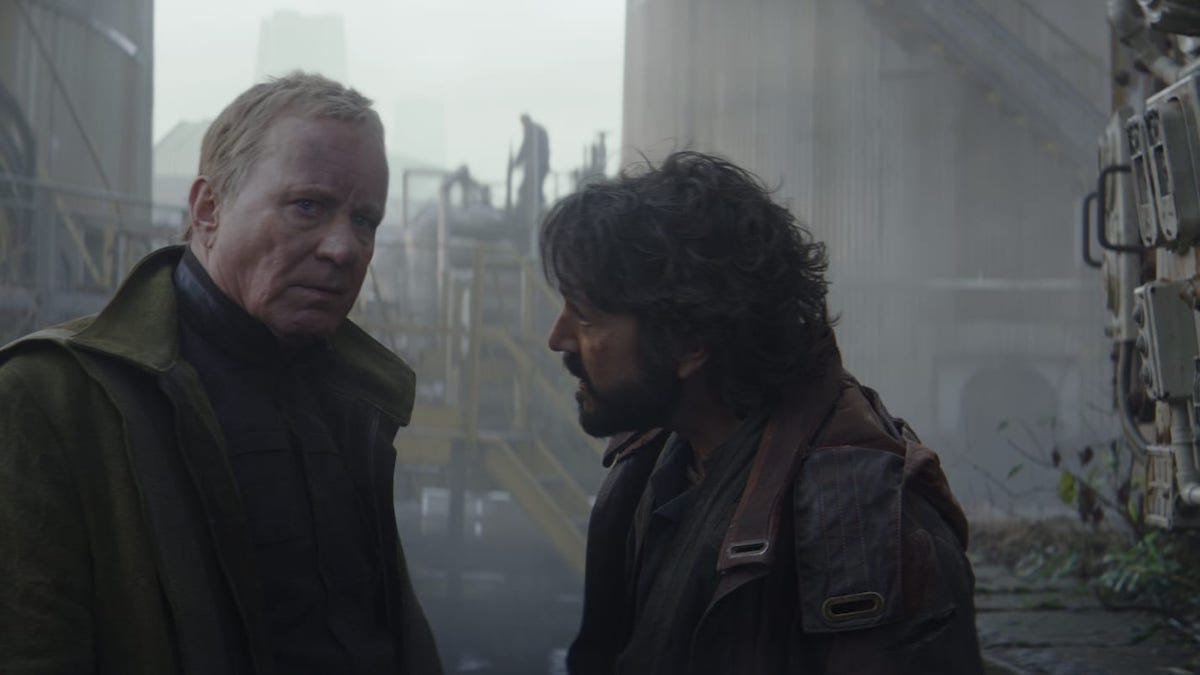
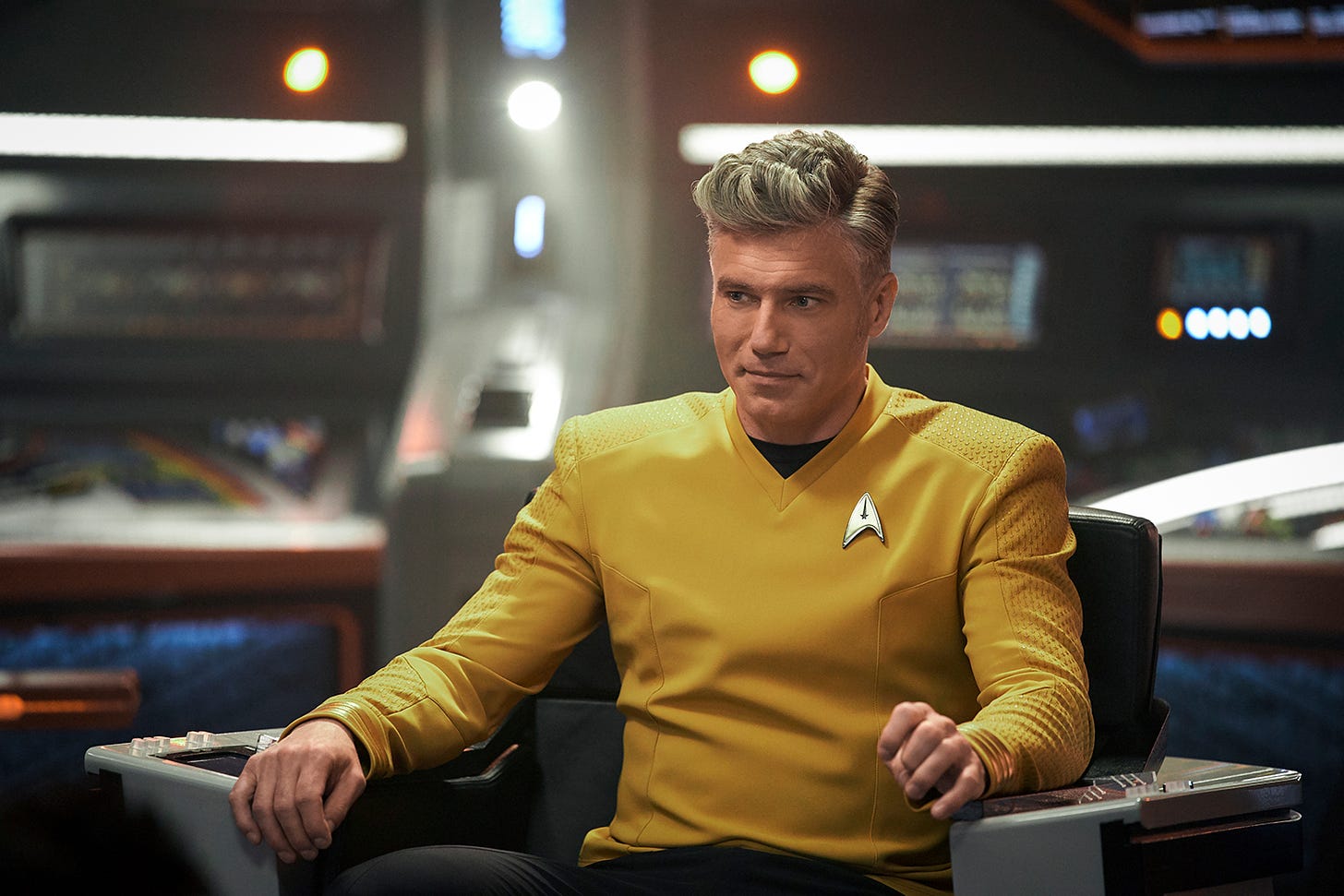


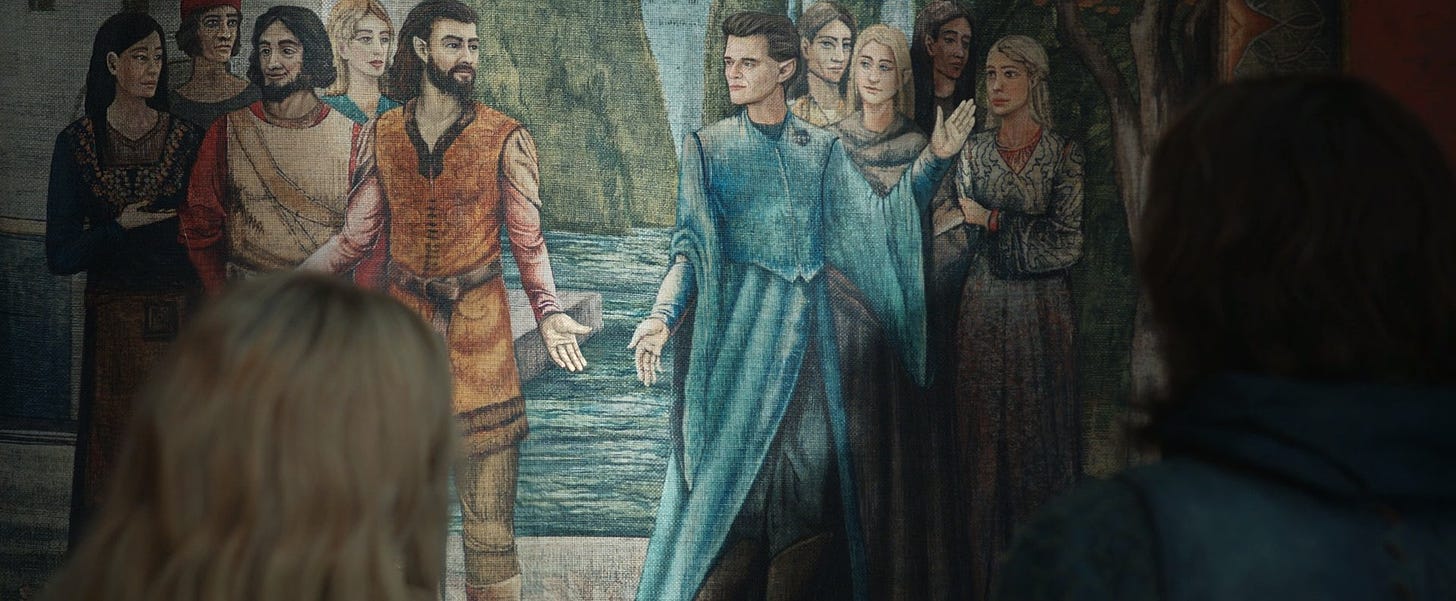


The addition of "Find the light and the shadow will not find you" in Bronwyn's version really bugged me. It seems to me like one of those toxic positivity type things. And the whole point of the passage from the book is not that you can be safe from the shadow, but that the shadow doesn't have the final word. Saying "the shadow will not find you" seems like just an empty promise. And it works better in the books, because like you said, Sam has earned it. He's been through terrible things. He's seen the power of the shadow. He's literally in Mordor, under the shadow! So it feel less like some sappy, wishful thinking and more of a powerful insight that even if they fail, in the end evil will also fail.
I partly have strong feelings about this quote because it's one of my favorites. I have a tattoo of mountains, clouds, and a star with the words "only a small and passing thing" in the LOTR font. :)
"But at the moment it’s simply not very compelling because we all know the ending and it doesn’t seem like The Rings of Power is doing anything to subvert that or turn it into a strength."
I don't entirely agree with that, because what the series definitely is doing is developing personal relationships between Sauron and his future enemies. In addition to tempting Galadriel, Sauron also tellingly saves Elendil's life during the big battle in the Southlands. This makes Elendil's ultimate death at Sauron's hands quite ironic and far more personal.
I'm certain S2 will try to similarly develop a personal relationship between Isildur and Halbrand, given that they are both on Mordor territory. Thus, their final fight could very well be a battle between two former allies, possibly even friends.
Regarding to where to post your thoughts on Rings - perhaps in Substack Notes in addition to Twitter?